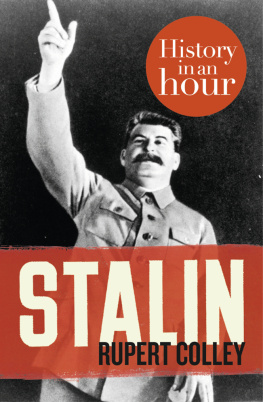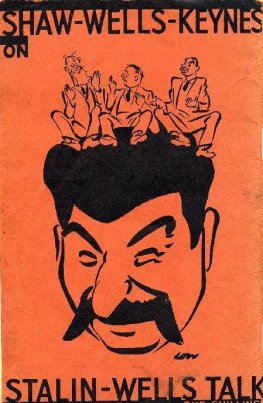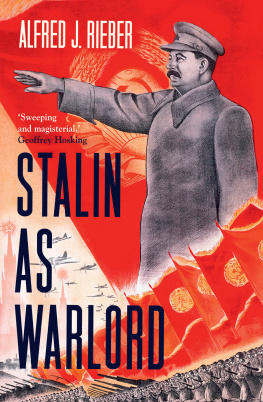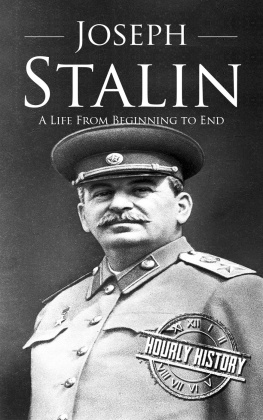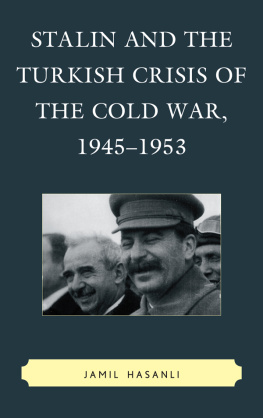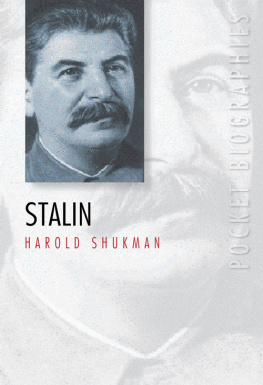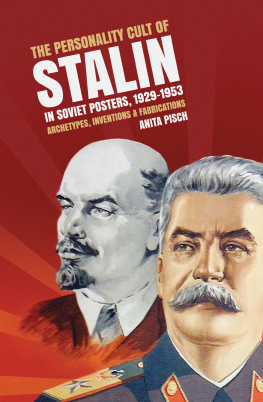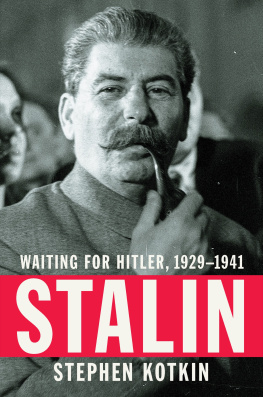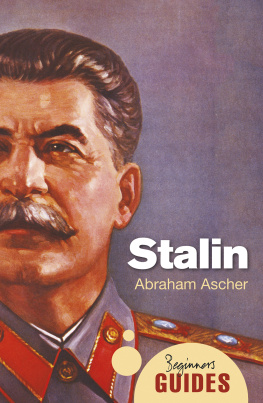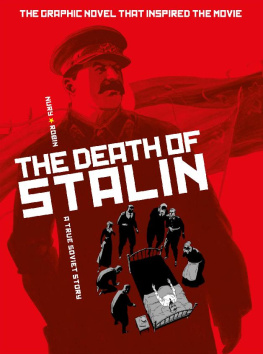
STALIN
History in an Hour
Rupert Colley

History in an Hour is a series of ebooks to help the reader learn the basic facts of a given subject area. Everything you need to know is presented in a straightforward narrative and in chronological order. No embedded links to divert your attention, nor a daunting book of 600 pages with a 35-page introduction. Just straight in, to the point, sixty minutes, done. Then, having absorbed the basics, you may feel inspired to explore further.
Give yourself sixty minutes and see what you can learn
To find out more visit http://historyinanhour.com or follow us on Twitter: http://twitter.com/historyinanhour
Contents
Note on dates
Until January 1918, Russia used the Old-Style Julian Calendar that before 1900 was 12 days behind our Gregorian calendar, and after 1900, 13 days behind. This text uses the New Style throughout.
It is said that no person in history had such a direct impact on the lives of so many as Joseph Stalin had during his lifetime. That impact was, almost without exception, ultimately negative. In Hitlers Germany, by comparison, if you were not one of the persecuted groups and tacitly supported the regime you were generally safe. In Stalins Soviet Union, his Terror knew no limits, it did not discriminate: no one was safe, no institution, no single town or village was immune. Yet, following his death in 1953, Stalin was deeply mourned.
In Russia today, he is still admired by many. A 2008 Russian-wide poll put Stalin as the third most revered figure in its history (amidst suspicion that the vote had been rigged to deprive him of being first). Stalin had received the country with a wooden plough, and left it with a nuclear missile shield. No one else, it could be argued, could have led the Soviet Union to victory in the Second World War. Of Stalins role during the war, Vladimir Putin has said, Whatever anyone may say, victory was achieved.
So, who was Joseph Stalin and what was his role during the Russian Revolution? How did he come to power, what made him such a destructive tyrant, and how did he impose his will on the Soviet Union for so long?
This, in an hour, is the story of Joseph Stalin.
Joseph Stalin suffered many complexes about himself. As a child he endured a bout of smallpox which left his face permanently pockmarked; a childhood accident caused his left arm to be four inches shorter than the right; his second and third toes of his left foot were joined; he had bad teeth from his many years in exile (black, irregular and turned inward by one description); and, most damning for such a towering figure, he was only five feet and three inches tall. Specially-made shoes gave him an extra inch or two but his height, or lack of it, remained a constant source of irritation.
Stalin was born Joseph Vissarionovich Dzhugashvili in the small Georgian town of Gori, Georgia at the time being part of the Imperial Russian Empire, an empire constrained by feudalism and ruled by the autocratic and unpopular Romanov dynasty. His date of birth was the 18 December 1878 but for reasons that remain a mystery, Stalin always maintained he was born on 21 December 1879 and it is this date that was celebrated throughout his life.
Stalins father, Vissarion Dzhugashvili, known as Basu, was a shoemaker. An alcoholic, he spent much of his time in Tiflis (now Tbilisi, the Georgian capital, 50 miles east of Gori) producing shoes for the Russian army. On his drunken and increasingly rare appearances at home, he would beat his wife and son. Stalins mother, Ekaterina, or Keke, also meted out punishment on her son but generally was protective of her Soso (Georgian for Little Joey), especially as her first two children, both boys, had died in infancy. Stalin only learnt to speak Russian when aged about nine and he never lost his strong Georgian accent.

Stalin aged 15, 1894
Stalin was brought up in an atmosphere of violence. Gori was a rough town, in which its male inhabitants enjoyed organized street brawling, lasting for hours at a time. On 13 February 1892, Stalin, alongside his schoolmates, witnessed the public hanging of two criminals. The executions were botched and Stalin, traumatised, came away with a new-found hatred of the tsarist regime.
Stalins mother, determined that he should have a respectable position in life and to repay Gods benevolence for his survival, sent him to a church school. Young Soso did well. He sang in the church choir and impressed his teachers with his intelligence and, in memorising large tracts of the bible, his excellent memory. Earning top marks, he graduated two years ahead of schedule in 1894. At the age of fifteen, Stalin was awarded a scholarship to the theology seminary in Tiflis. But the teenage Stalin was more taken with the writings of Marx and Engels than the bible and, declaring himself a Marxist and an atheist, joined the Russian Social Democratic Labour Party (RSDLP), extolling his fellow students at the seminary to do likewise.
In 1899, Stalin was expelled from the seminary, supposedly for his Marxist leanings. Having adopted the revolutionary name of Koba, the name of a Georgian Robin Hood-type folk hero, he worked for two years as a clerk at the Tiflis Meteorological Observatory his only formal job. While working, he became involved in organising strikes, writing articles for socialist newspapers and making revolutionary speeches.
In 1901, avoiding arrest for agitation, Stalin fled to the Georgian coastal town of Batum where the RSDLP encouraged him to stir unrest among the workers of an oil refinery. In February 1902, Stalin helped organise a strike for which he was imprisoned. Having spent eighteen months in jail, he was deported to Siberia, his first of several periods of forced exile.

Stalin aged 23, 1902
In his attempts to avoid the Okhrana, Tsar Nicholas IIs secret police, Stalin adopted several different aliases and was constantly on the move. Yet, between 1902 and 1913, he was arrested six times, each time managing to escape and return west, often travelling on forged documents. The comparative ease of escape merely hopping onto a westbound train led to speculation that Stalin was in the employ of the Okhrana as a double agent. He was arrested for the final time in February 1913 and was exiled to various inhospitable parts of Siberia for four years. These years hardened him and made him cynical, the effects of which would be felt years later when he imposed his heartless rule over millions.
Stalin married his first wife, the devout Ekaterina Svanidze, nicknamed Kato, in 1906. To appease his in-laws, Stalin agreed to marry in an Orthodox church. Together they had a son, Yakov, born 18 March 1907, but with Stalin so often absent, busy inciting unrest, his wife and son saw little of their wandering revolutionary. Kato died of typhus in December 1907. She was 22. At her funeral, which, again, Stalin allowed to take place in an Orthodox church, he reputedly said, this creature softened my heart of stone. Shes died and with her have died my last warm feelings for humanity. He ignored his son, who was brought up by the Svanidzes. In later years, Stalin ordered the arrest and execution of much of Katos family, including, in 1941, her brother, Alexander Svanidze, an old school friend of Stalins, who, thirty-five years before, had introduced him to his sister.
Next page
